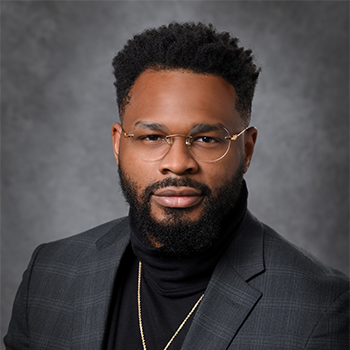Academic Staff View: Black history matters
February 2, 2023 - Jahshua Smith
Jahshua A.K. Smith (He/Him) is a diversity, equity and inclusion specialist in James Madison College. He holds a B.A. from Michigan State in broadcast journalism, having graduated from the university in 2008. A former student leader for Multi-Racial Unity Living Experience (MRULE-ICA) as well as a Minority Representative for the State News editorial board, Smith brings a long history of student advocacy on campus and many years of leading youth developmental initiatives.

The spirit of Black History Month has been ingrained in my cultural and academic upbringing since the earliest days of my childhood. As a second-generation Michigan State alumnus, my identity is largely shaped by my appreciation for my culture and the African-American people who forged a path that not only allowed me to attend a university but also to be in the advocacy role I am in today.
I vividly remember being introduced to Black History Month as an elementary school student at Bates Academy in Detroit. We played a game called “Bates Battle,” organized as a trivia game show that taught us and reinforced the contributions of Black pioneers. That game was my incentive to study more about my culture (albeit for bragging rights), but it also reaffirmed my desire to learn more about my history.
Bates Battle, coupled with an assortment of books, articles and other resources I could find at my disposal at home, enhanced what I knew about the African diaspora even at a young age. Over time I discovered how anomalous that understanding had been compared to some of my friends'. By the time I reached MSU, it became even more apparent that there were many Black students who had very little exposure to Black history.
Black students often find themselves at schools like Michigan State, facing a dearth of faculty who share their identity. When we think about student success, representation matters.
My closest mentor during my time as a student was Dr. Richard Thomas, now Professor Emeritus of history. His course “Historical Approach to Contemporary Issues” is one that I enrolled in my junior year. During that fall semester, I found myself on the cusp of flunking out, struggling to balance academics with personal matters but, through his coaching and guidance, I was able to pull through and post my highest GPA. He would inevitably serve as one of my greatest influences, shaping the person I became after graduation. Dr. Thomas' presence helped my development as a Black man in college, sharing wisdom that I now impart to the next generation of Black students, as well as others of color.
As his student, I learned more about the groundbreaking U.S. Supreme Court decision in Brown vs. Board of Education of Topeka, that banned segregation in public schools. I learned the name Charles H. Houston, a pioneer in law who for 25 years created litigation strategies aimed at racial housing covenants and segregated schools. He trained several young lawyers (including future Supreme Court Justice Thurgood Marshall) to create a compendium of cases that would successfully dismantle the legal theory set in Plessy v. Ferguson.
Those crucial lessons taught me why a college education is so important, causing me to wonder how many Black students graduate without this knowledge.
The work those before me put in, inspires me to do the work today. Part of my job as a DEI specialist in our newly minted JMC Office of Justice, Equity and Inclusion, is to serve as a recruitment coordinator. In this role, I push for greater college access — particularly for minoritized students — leading discussions designed to make our college and university more diverse, fostering a new generation of thinkers.
To serve at a residential college that frequently marries concepts of policy and law, I remain determined but also weary of how Black History Month has been commodified. An intersection of dog whistles masquerading as legitimate critique of educational policy, meeting the naked tokenism by corporate and non-profit organizations alike to champion equity for African-Americans during one, 28-day month, continues to seriously dim the luster of what the Black History Month has meant for me every February.
Nevertheless, it is my sincere desire that this month on campus embodies the spirit of perseverance — as there still is much work to be done — and gratitude for the Black Spartans across campus working hard to be leaders in their chosen fields. May their efforts continue to resonate as we move forward.

